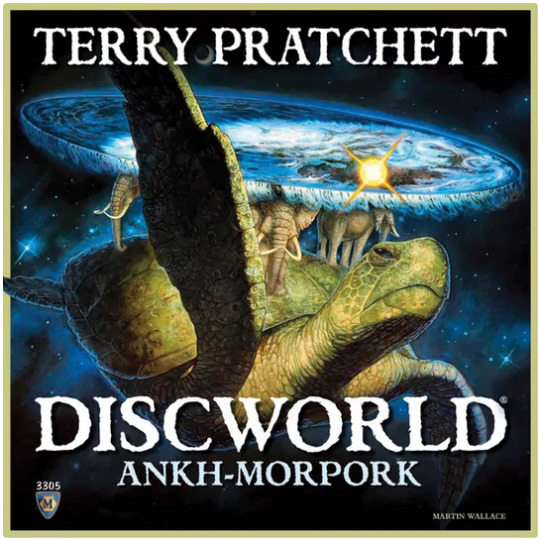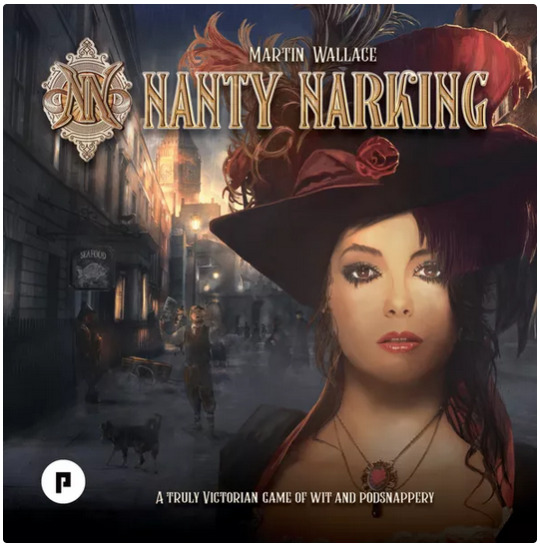#tabletop game mechanics
Explore tagged Tumblr posts
Text
How to play a tabletop RPG, and how to be an elitist jerk about it at the same time.
Level up your #TTRPG skills! 🎲 Our latest blog post demystifies tabletop RPG gameplay, explores the Hickman Revolution, and debunks elitist myths. Perfect for both newbies and veterans! Dive in now and roll your way to greatness. #TabletopGaming #RPGRevolution
I AM RIGHT; YOU ARE WRONG – GET OVER IT I received a lot of flack because of the second segment of the 12 Jan 2024 Some Rando RPG Livestream. There are many people who think that by focusing on one aspect of a role-playing game that they are some sort of true RPG purist or better at playing RPGs than other people. Newsflash: They are not! For my rant I cited my own RPG Harmony Axes graphic and…
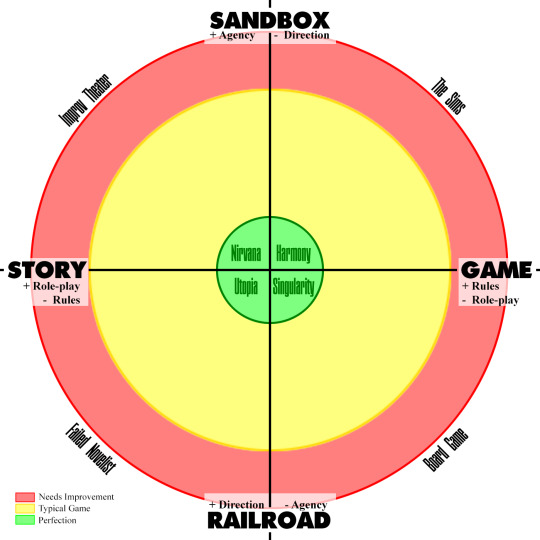
View On WordPress
#alternative rpgs#dungeon mastering#fantasy gaming#game master strategies#hickman revolution#legion of myth#pen and paper rpgs#role-playing game innovations#role-playing game tips#rpg community debate#rpg elitism#rpg game design#rpg hobby analysis#rpg hobby insights#rpg inclusivity#rpg player diversity#rpg player tactics#rpg purist myths#rpg storytelling#tabletop game mechanics#tabletop gaming culture#tabletop gaming trends#tabletop narrative play#tabletop rpg guide#ttrpg for beginners
1 note
·
View note
Text
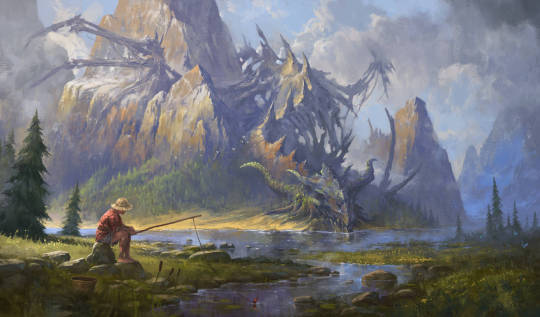
Image credit "Fishing" By yonaz
So in last night's 3.5 edition D&D game, my players had a chance to do some ice fishing and one player called out for one of my ad hoc mini-games (I do this a lot haha). I wanted something simple, a combo of character skill and some luck, and so in short order ended up with this very quick mini-game you can easily employ.
:
Quick Disclaimer: These fishing mini-game mechanics may not be entirely original and could resemble systems from other games I just can't recall. For my part, I'm posting this FOR sharing. Feel free to use, adapt, or modify them in your own games as you see fit. No ownership or exclusivity is claimed over this idea—enjoy and share as you wish!
:
Fishing Mini-Game (D&D 3.5 Edition)
Step 1: Build the Fishing Pool
The player rolls a number of d6 equal to their relevant skill modifier (Survival or Profession (Fisher)).
Example: A character with a +10 in Survival rolls 10d6 and sets these dice aside as their "Fishing Pool".
Fishing Pool Example Roll: 1, 1, 2, 3, 3, 4, 4, 5, 5, 6.
Step 2: Perform the Fishing Check
The player then rolls 5d6 as their "Fishing Check" for one hour of fishing.
Example Roll: 1, 2, 4, 4, 6.
Step 3: Match for Combos
The player now attempts to match the dice results from their Fishing Pool with their Fishing Check results to form combos. The number of dice used in the combo determines the size of the fish:
Small Fish: Match 2 dice from the Fishing Pool with the Fishing Check.
Medium Fish: Match 3 dice from the Fishing Pool with the Fishing Check.
Large Fish: Match 5 dice from the Fishing Pool with the Fishing Check.
Example Combo:
If the player's Fishing Pool has dice showing 1, 2, 4, 4, and 6, they could match all 5 dice with their Fishing Check, catching a Large Fish.
Step 4: Fish Weight and Rations
Once the fish is caught, the total weight of the edible parts of the fish is determined by summing the values of the dice used in the combo.
Example: For a Large Fish (1, 2, 4, 4, 6), the total weight is 1+2+4+4+6 = 17 kg.
To calculate the number of rations provided by the fish:
1 kg = 2,000 calories (or half a ration).
Rations Formula: Divide the total weight of the fish by 2.
Example: 17 kg / 2 = 8.5 kg or 8 rations (we round down).
Step 5: Continue or Stop
After catching a fish, remove the dice used from the Fishing Pool.
If the player still has at least 2 dice left in their Fishing Pool, they can attempt to catch another fish using the same Fishing Check results. Otherwise, they are done for that hour.
That's all that we did and they loved it!
But since then we've considered how future games or others might expand on it with special roll combos, items, locations, setting conditions, Aid Other, etc. So here are some...
Optional Add-Ons and Considerations
Multiple Attempts Per Hour:
If the player rolls exceptionally well on their Fishing Pool, they may be able to attempt fishing multiple times in an hour. To keep this simple, I'd say if they are able to clear the first Pool entirely, they get a brand new roll, a whole new Pool as if starting fishing over, but they keep their previous catches.
Modifiers and Conditions:
You could introduce conditions that affect the Fishing Pool or Fishing Check rolls:
Good Fishing Spot: +1d6 to the Fishing Pool.
Bad Weather/Overfished Area: -1d6 (or more) to the Fishing Pool or disadvantage (see 5e, we use this idea quite a bit even in our 3.5e games) on Fishing Check rolls.
Magic/Luck Items: Grant rerolls or bonus dice to the Fishing Pool or allow rerolls of the Fishing Check.
Special Fish Combos:
Occasionally, you could allow rare or magical fish (or larger species) that provide bonuses or other effects; perhaps these are possible if the combos use specific die results:
Giant Fish: Requires a match of dice with identical values, but double the weight result (ex: a medium fish that used 5,5,5 would be a Giant of its type, and grant 15x2 or 30 kg of edible parts!).
Magical Fish: Grants temporary bonuses, like extra HP or special buffs, when consumed. (ex. A combo of sequential rising values, like 1,2,3,4,5, would grant a Magical Large fish)
Fishing Tools and Bait:
Fishing equipment or bait could modify the rolls:
Better Rods/Lines: Allow rerolls or add extra dice to the Fishing Pool.
Special Bait/Lures: Increases chances of catching better or more fish (ex. set any one die result to 6; or allow player to select the value of any one die, etc.).
Aid Other
Another player can choose to assist Player A if they are proficient in the same associated skill (Survival or Profession (Fisher), etc based on your setting):
Player B (helper) rolls for the associated skill.
If the result of their skill check (rolled like any other skill check) is 10-19, Player A gains 1 extra die in their fishing Pool.
If the result of their skill check is 20 or higher, Player A gains 2 extra dice in their fishing Pool.
Player A can then use these extra dice to help form better combos when matching against their Fishing Check.
Let me know if you use this mini-game in your D&D sessions, or revamp it for the tabletop rpg/edition you play!
I'd love to hear your stories of the biggest catch, or lamenting that one LEGENDARY CATCH that got away!
And check out Tabletop Gaming Resources for more art, tips, and tools for your game!
#mini-game#mini game#mini games#homebrew#3.5e homebrew#3.5 edition#fishing#survival#fish#profession#skill challenge#steal this idea#tabletop rpg#rpg#tabletop gaming#pen & paper#roleplayer#roleplaying games#games#inspiration.pen & paper games#dnd#d&d#pathfinder#dungeons & dragons#dungeons and dragons#fantasy rpg#d&d 3.5e#d&d 3.5#mechanics#game mechanics
232 notes
·
View notes
Text



Exerpt from Eureka: Investigative Urban Fantasy. (with art from team artist @qsycomplainsalot)
#game master#dungeon master#itch.io#itchio#indie ttrpgs#ttrpgs#ttrpg design#ttrpg#ttrpg tumblr#ttrpg community#indie ttrpg#ttrpg art#rpg#tabletop#roleplaying#wristwatch#game mechanics#artists on tumblr#rpgs#free rpg#supernatural rpg#eureka#eureka: investigative urban fantasy#team artist
142 notes
·
View notes
Text
I believe this might have been already said by someone at some point, but I feel like what I have to say is tangentially related to the recent trends in online ttrpg spaces and so I'm going to say it anyway.
When writing a TTRPG YOU CAN EXPLAIN WHAT IS THE PURPOSE OF A CERTAIN MECHANIC. It's legal. You won't go to jail for that. It's so helpful. Please do it.
I'm running early beta tests of my own ttrpg and all of my testers find it so surprisingly useful. The fact that the little explanation next to your rule has a little "this is to facilitate X amongst the players" or something like that at the end is of great help to the players and of even greater help to the GM, and I can't stress this enough.
#ttrpg#fantasy#tabletop rpg#warhammer fantasy#pathfinder 2e#tabletop role playing game#game mechanics#game design#roleplaying games
351 notes
·
View notes
Text
I always thought the paladin class was kind of bland, vanilla, and boring. Like many others on forums, I shared the opinion that they were just annoying goody two-shoes. That was until I took a moment to actually read their tenets, especially the Oath of the Ancients:
Kindle the Light: Through your acts of mercy, kindness, and forgiveness, kindle the light of hope in the world, beating back despair.
Shelter the Light: Where there is good, beauty, love, and laughter in the world, stand against the wickedness that would swallow it. Where life flourishes, stand against the forces that would render it barren.
Preserve Your Own Light: Delight in song and laughter, in beauty and art. If you allow the light to die in your own heart, you can't preserve it in the world.
Be the Light: Be a glorious beacon for all who live in despair. Let the light of your joy and courage shine forth in all your deeds.
How beautiful is that? I want to follow these tenets in real life.
The paladin class is about working toward an ideal so strong, so unwavering, that it manifests as magic. Maybe my interpretation isn’t perfect, but thinking about a paladin breaking their oath now feels much sadder. How I choose to see it, an oathbreaker is not a person who accidentally broke a tenant but a person that stop believing in the dream of a better future.
#paladin#dnd#dungeons and dragons#roleplaying games#fantasy#oath of the ancients#character design#tabletop rpg#rpg thoughts#dnd character#magic#moral choices#fantasy inspiration#gaming#dnd lore#storytelling#roleplaying#ttrpg#dnd oaths#character growth#game mechanics#fantasy philosophy#dnd alignment
33 notes
·
View notes
Text

Heavy Gear: When All Hell Breaks Loose
The second Heavy Gear print ad, featuring the Jaguar in it's final form with V-engine and the "standard" Jaguar helmet (although this would soon be modified, partly to facilitate miniatures production). Note that this Jaguar is carrying a snub cannon, which would not be the Jaguar's standard armament when the Heavy Gear RPG/Wargame was released later (stats for the snub cannon armed "Predator Jaguar" were published in a later supplement).
#Mecha#Heavy Gear#When All Hell Breaks Loose#Mechanized Gaming Will Never Be the Same Again#Heavy Gear RPG#Heavy Gear Tactical#Mecha Gaming#Wargames#Miniatures Wargaming#Roleplaying Games#Tabletop RPGs#Tabletop Roleplaying Games#Card Games
61 notes
·
View notes
Text
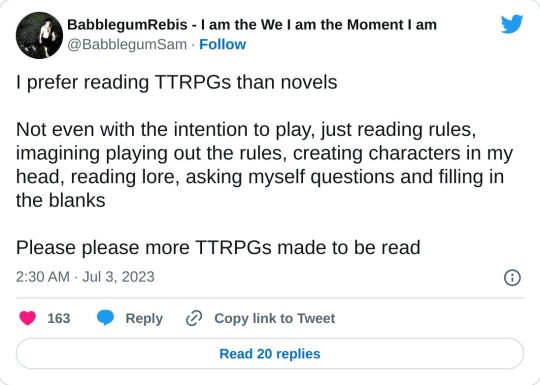
Been thinking about this & putting it into practice when writing The Perilous Pear & Plum Pies of Pudwick for a while: thanks to the ever excellent @babblegumsam (who you are probably already following and if not now is your chance to rectify that) for the final straw that made me write this up today. I truly believe if you have any interest in TTRPGs, play, or design you'll get something out of it, it's a further 5.4 mins read from here on out.
--------------------
Play is interaction.
Reading is interaction.
Below I will argue the necessity & usefulness of thinking the relationship between reading & play in TTRPGs as (almost) the exact same thing to unlock a wide & deep potential as reader/player/designer.
--------------------
Reading & play don't have to be the same thing. But you can't play without reading (in the sense of reading representations, images, ideas, concepts, interactions, etc, not just written text), because then there could be no interaction.
Reading and play can both accurately describe a given act or process. For instance: I read a table or piece of prose in a TTRPG book.
I say this because this is an idea that people struggle with, and while I encourage debate around the concept, we first have to agree on some basic building blocks that I hope I'm able to communicate here. For instance, there exists a potential reality in which tabletop roleplaying games are called tabletop reading games and nothing else about them changes (except for the consequential ability to think of reading in ttrpgs as play, and the potential this tool unlocks), because the prerequisite role for all other roles being played in a role-playing game is that of the reader.
This is true for much more than TTRPGs, but if we simply focus on acknowledging that reading & play in ttrpgs can and often are the same thing, then we are able to make informed design choices on this basis that we otherwise lack the agency to make – and which are nonetheless choices that are being made while we miss the opportunity to observe, read & ultimately interact and/or change and/or play with them.
To not think of the relationship between reading & play in TTRPGs in this way is to limit your agency as a designer, reader, player, and ultimately to cause yourself to be unable to synthesise these roles which are deeply inter-related, perhaps more so than they are disparate.
However you define it, Good Design necessitates the application of the right tool for the job. This requires making, maintaining & improving the tools that you have access to. The reader/player relationship is not only one of these, but an integral one that precedes a great many (if not all) of the other tools that you can & do employ as designer/player/reader.
If you allow this tool to remain blunt and imprecise (and especially if you don't acknowledge that it exists and that you use it in every choice you make), what you are doing is making a choice to blunt all of your other tools, even if you aren't aware of it.
This is poor design, poor play, and poor reading,* and I believe that this is true regardless of how you define each of those terms.
*though of course we could - and I think should - argue over the semantics & limitations of my imprecise use of the word "poor" there and the further ideas it smuggles in unacknowledged, but I trust that you will be able to infer what I'm trying to communicate in my use of it and I further hope that by leaving this imprecise application of a tool here in the way that I have used it, it might serve as a good example of the consequences, limitations & potential dangers of applying tools/terms/ideas that might be best described as "too blunt for the job", which is the very thing I'm attempting to highlight & address here.
It would not seem very sensible to choose to limit yourself in this way unless it allowed you access to new tools, which is a choice that you could only make once you are familiar with the central idea I'm presenting here – in other words, if you break the rules without understanding them you are very unlikely to be taking a step forward and much more likely to just be shuffling in place or even stepping backwards.
I hope that this short interaction has unlocked or reinforced your access to a useful tool that will allow you to sharpen your understanding of the play/reading relationship in TTRPGs and in turn refine & maintain your existing tools and your ability to synthesise new ones.
I look forward to discovering with you what new agencies this allows us to unlock, and I hope you take what you have read here and play with it to design new realities that you & I have yet to imagine.
#reading#play#ttrpg#indie ttrpg#ttrpg design#indie ttrpg design#tabletop roleplaying#games#game design#design theory#theory#design blog#ttrpg blog#ttrpg ideas#ttrpg resources#ttrpg mechanics#ttrpg dev#indie ttrpg dev#rpg design#ttrpgs for everyone#dialectics#communication design#communication theory#design philosophy#ttrpg community#ttrpg family#《 not a fan of that as a tool btw it is incredibly limiting and we could all do without it. why not be more precise & why not start now#any other useful tags you can think to add please do so. i think this deserves to reach far and wide & is very useful if i do say so myself!#Finally: take it and run with it. play/change/sharpen/blunt this tool. it's yours. make it your own (or dont). dont do what i say (or do) 🤡#respect & solidarity and thanks for reading. I hope you have found value in my contribution 🤝
279 notes
·
View notes
Text
Hey TTRPG Nerds
I’m back on my bullshit again. What are some indie games with unique systems that aren’t D&D, PBTA/FitD, or Fate-based?
How do they use unique mechanics to accomplish cool stuff?
Story games, OSR, you name it — all welcome!
#also like obviously excluding stuff like savage worlds and world of darkness#no Big Game Companies#I wanna see your weird and wonderful#even better if it used a resolution mechanic other than dice#looking at you dread my beloved#ttrpgs#tabletop#ttrpg#indie games#role playing games
27 notes
·
View notes
Text

SUN Group is an early East-West corporation, and often has to work primarily as a licensor for domestic production lines as a result of their unique geopolitical situation. Among their early successes are the Skała and Głaz, the former of which is a formidable city brawler.
The WK-03 Skała, a cityfighting defender mech developed by the SUN Group. Commissioned art for Metallurgent, an in-development mech TTRPG, inspired by Battletech and Armored Core.
[ Commissions Open ]
#mecha#mechanical design#spider tank#giant robot#scifi art#metallurgent#ttrpg art#tabletop games#my art#art commissions#commissions open
70 notes
·
View notes
Text
The thing about TTRPGs (and Solarpunk)

There is one thing in terms of Tabletop RPGs, that within the TTRPG development scene is a well-known issue. A lot of folks, who are playing TTRPGs come from the big games in this regard. Dungeons & Dragons, Pathfinder, World of Darkness, Shadowrun, GURPS and maybe FATE. And while FATE is a bit lighter on this issue, it is still there. And that issue? Those games are all about combat.
Don't get me wrong. This is not an issue per se. If you want to play a combat game, all power to you. It can be fun to just go around and kill things in a fantasy world. Duh.
But the thing is, that for the most part the rulebooks for these things tend to be 50% combat rules, with the rules for everything else being often comparatively light weight.
Here comes the issue: If you have a hammer, everything looks like a nail.
Which means for TTRPGs: If you have a rulebook based around combat, your instincts when it comes to solving a problem within the game tends to be "punch it until it stops moving". Which is why a lot of games played, they will spend a considerable amount of time fighting things.
Again: If you like to play combat games, that is great. But for everyone who wants to try anything else... that is an issue.
Of course, for individual games this can be solved with a good old Session 0 and in some cases a heavy helping of house rules, if whatever you want to play is not properly covered by the rules... But it tends to not be the default.
And this brings me to the Indie TTRPG scene. Because this issue tends to push into the Indie scene as well. Especially new IndieDevs tend to make detailed combat rules, even if they do not want to make a combat-heavy game, because they have the feeling of "this is a TTRPG, this needs combat!"
But here is the thing: It doesn't, of course. You can make TTRPGs based around all sorts of mechanics.
Which brings me back to Solarpunk - as mentioned in the title. I have now seen several Solarpunk TTRPG rules. And a ton of them featured a plethora of combat rules, even though they do not even properly feature any scenarios that would require combat in their worldbuilding and what not.
Admittedly, I am still struggling with this myself. I am currently working on two mini-RPGs with Solarpunk settings. And I always need to fight the need to make up combat rules.
And I really think we need to think about the kinda stories we can tell with TTRPGs and how to make games, that are not about combat.
What kinda TTRPGs would you like to see?

#ttrpg#tabletop#tabletop gaming#tabletop rpg#rpgs#indie rpg#indie games#game mechanics#dungeons & dragons#world of darkness#shadowrun#pathfinder#solarpunk#lunarpunk
72 notes
·
View notes
Text
30 Second Playtest
"The Bargain Mechanic"
When your players are rolling like absolute garbage and they’ve expended all their re-rolls, turn to them and ask: “How much do you want this?”
Then, encourage them to expend one of their more valuable resources like a spell slot, hit die, or “long rest” abilities to get one more try. Encourage players to push back on the outcome of a bad roll for the sake of the story.
Somewhat inspired by Candela Obscura and the Illuminated Worlds system
#TTRPG#DnD#Candela Obscura#Illuminated Worlds#Critical Role#Playtest#Mechanics#Game Design#Tabletop Games
49 notes
·
View notes
Text
it's unbelievable to me that rain world is NOT considered "one of the greats." many "greats" only improved on extant genres. STARDEW VALLEY does not deserve to be considered one of the greats more than rain world. CELESTE does not deserve to be considered one of the greats more than rain world. ELDEN RING does not deserve to be considered one of the greats more than rain world. i don't like, hate these games, they're all good games, but they objectively built on well-established genres and mechanics. if you asked me for games almost identical in gameplay but a little worse than ANY of those games made BEFORE they were made i could give them to you, but i can't name a single game that plays like rain world. it makes me feel like a feral animal that people will praise games like dark souls for the difficulty but they all whined about the difficulty in rain world as if it was a bad thing, as if the plot of the game did not deliberately emphasize this for a deeper appreciation of a mostly non-verbal story. most of the game IS NOT random and has been well-documented and picked apart in the code, but it gave the illusion of being random because the game has an absurd amount of depth put into the mechanics that mirrored the procedural animation used to produce its aesthetic.
#and most certainly (gasp) baldur's gate 3 does not deserve to be considered more innovative and memorable than rain world#its mechanics are LITERALLY a carbon copy of a famous tabletop with some homebrew#most of its appeal comes from that and the absurd amount of branches in its story#and it's not the first game to give you a branching choose your own adventure story either even if the depth is very extreme#none of that makes it a bad game at all but a game considered more innovative and influential??????#in what way will it influence besides encouraging other devs to produce the same specific genre as a cash grab???#and so on
31 notes
·
View notes
Text
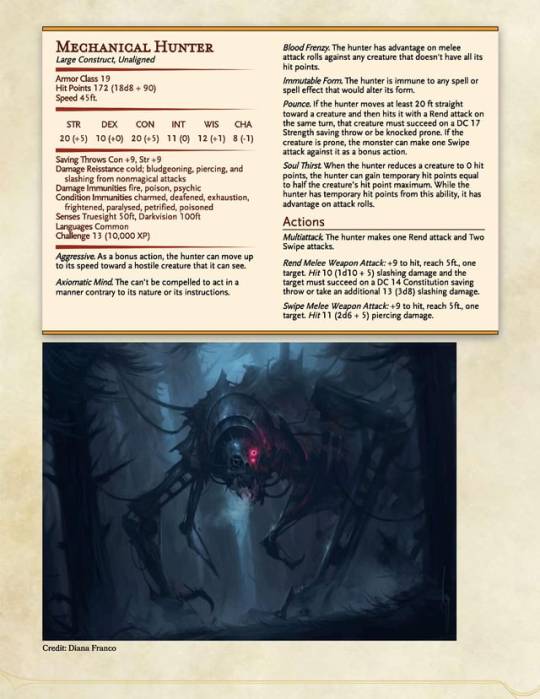
[reddit]
Check out Tabletop Gaming Resources for more art, tips, and tools for your game!
#large construct#mechanical hunter#monster#stat card#combat sheet#stat block#CR 13#dnd 5e#d&d 5e#5e#5e homebrew#tabletop rpg#rpg#tabletop gaming#pen & paper#roleplayer#roleplaying games#games#dnd#d&d#pathfinder#dungeons & dragons#dungeons and dragons#fantasy rpg
88 notes
·
View notes
Text
"Roll-A-Die" mechanics
There's a distinction in TRPG design that I haven't seen anyone articulate. To explain it, let's consider Dungeons and Dragons, the Mt. Fuji of tabletop RPGs.
On one hand, you have skills. You say you want to do something, you roll a die, and that die tells you whether you succeed or fail. That's the whole mechanic; everything else has to come from the players.
On the other hand, you have combat. There are well-defined guidelines for what you can do, when you can do it, and how it works. Success and failure are meticulously defined; if you succeed on an attack or fail a save, the effects are quantified and tie into the game's other mechanics in key ways.
The latter are "real" mechanics, with all the depth and complexity needed to produce interesting mechanics to play with. The former is just rolling a die.
I think this is a useful distinction to make in many contexts. On one hand, I've had lots of discussions where people argue that D&D's Persuasion and Survival skills are sufficient mechanics to justify its claim that social situations and exploration are pillars equal to combat.
On the other hand, it's hard to articulate what I like about PBtA's moves without explaining what sets them apart from roll-a-die mechanics. The explanations about what success and failure entail, in ways specific enough to be useful but vague enough to apply to any situation, are nice in a way that's hard
Two quick caveats!
First: This is a spectrum, not a binary. In fact, it's a spectrum that extends beyond the examples I've given in both directions. On one end of the spectrum, you have detailed simulationist mechanics, more specific and intricate than even typical "real mechanics". On the other end, you have mechanics that work without even rolling a die. (For instance, 5e's jumping mechanics define how high you can jump without a running start, no die roll required.) And there are plenty of mechanics in the middle.
Second: Roll-a-die mechanics are not always bad! They're simple, easy to remember, and quick. Roll-a-die mechanics are good for things that need to be resolved, but which aren't important to the game as a whole. It's only a problem if mechanics that are supposed to be important are reduced to roll-a-die mechanics.
#in principle there's an exception for rules-lite games that are just R-a-D mechanics...but I don't like those games so...#trpg#tabletop rpg#rpg#game design
16 notes
·
View notes
Text
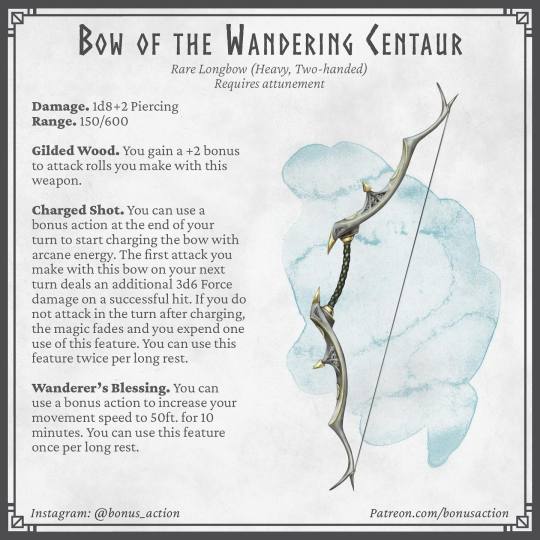
Bow of the Wandering Centaur
There aren't many official magic bows, so here's a nice homebrew one from @Bonus_Action.
It is pretty powerful, but I like the charging bonus action mechanic.
patreon.com/bonusaction
#Magic Bow#Magic Item#Homebrew#Bonus Action#Charging Action#Mechanic#DnD#D&D#Dungeons and Dragons#Fantasy#TTRPG#Tabletop#RPG#Roleplaying Game
30 notes
·
View notes
